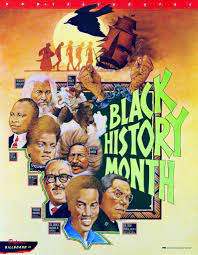Black History Month honors, celebrates Black achievements

This photo was accessed via Google Images under the Creative Commons License.
Black History Month has been celebrated in the United States officially since 1976. Consider getting involved this year to support your community!
February, often associated singularly with Valentine’s day, recognizes a far more serious and poignant topic: Black history. Nationally recognized since 1976, Black History Month (BHM) highlights the hardships and successes experienced by Black Americans over time, encompassing events from the implementation of chattel slavery in the 17th century to the establishment of Juneteenth as a federal holiday in 2021. In ways both subtle and extravagant, communities around the country annually observe Black history and advocate for further progress.
In 1976, President Gerald Ford designated February as a month to, “seize the opportunity to honor the too-often neglected accomplishments of Black Americans … throughout our history,” during the United States’ bicentennial. But the celebration of Black History goes back another 50 years, to historian Carter G. Woodson, who established a Negro History Week in the second week of February 1926. He elected this week because it is situated between the birthdays of Abraham Lincoln and Frederick Douglas and had historically been a time to honor emancipation.
For the next fifty years, Americans, largely in local communities and college campuses, celebrated both Black history and progress alongside the recognition of Black culture and identity as unique and joyous.
After the emergence of the Civil Rights Movement in the 1960s, the importance of Black History Month gained traction across the country as a means to incorporate the idea that “Black history is American history” in public schools and in the public consciousness. Since then, Black History Month has only grown in popularity and importance, especially since the explosion of the Black Lives Matter movement in the mid-to-late 2010s.
This year, Allegheny county is holding a variety of programming both virtual and live to celebrate Black History Month and the 2022 theme, Black Health and Wellness, chosen by the Association for the Study of African American Life and History. The Carnegie Library system is offering a series of virtual art classes and activities led by local Black artists in addition to featuring Black authors in their buildings and online. Also, the Carnegie Museums are running several different events throughout the month that showcase different aspects of Black history and achievements at their various sites. For more information on these events and others in the Pittsburgh area, see the City of Pittsburgh’s website at https://pittsburghpa.gov.
In Washington county, the LeMoyne Center held a presentation on February 24, both live and on Youtube, that spotlighted some of the most iconic Black figures in the 19th and 20th centuries.
Seniors Alexis Lawton and Jaidyn Sebetich think that the local community isn’t doing enough to observe the monumental contributions to American history that Blacks have made and offered a few suggestions for individuals to get involved.
Lawton thought that, “extravagant measures don’t need to be taken, but just a little acknowledgment such as bringing in food or watching a movie helps to represent BHM. The school could bring in speakers to inform students a little more about BHM’s history and cultures.”
Sebetich offered that simply learning about the history behind Black History Month and African Americans in general is a great way to get involved.
Additionally, Junior Ethan Adams suggested that “someone could donate to black organizations and charities, attend any Black History Month events [or] support Black-owned businesses or restaurants,” as a way to participate in Black History Month.
As Adams proposed, recognizing Black History Month doesn’t have to be large-scale or fanciful; even the smallest support of BHM can be meaningful. Consider any of the above recommendations, or see this article from CNET for more ideas.
This month, try to find some way to honor the contributions that Black Americans have made to the nation’s history, but keep in mind Lawton’s final reminder for anyone who chooses to celebrate, “Just because it’s Black History Month doesn’t necessarily mean other people who aren’t Black need to be shut out [from BHM] … BHM is a month meant to spend time with others and people you love.”
Outside of school, you can usually find Emma dancing, solving word puzzles, buried deep inside a book, or dreaming of some new and delicious dessert to...










